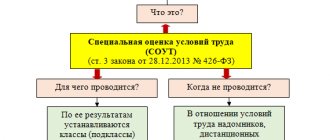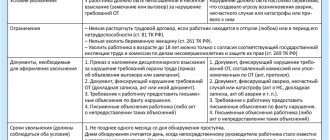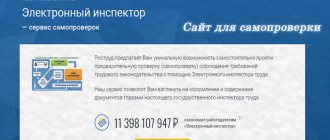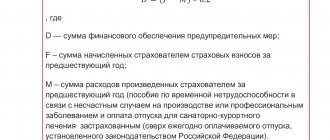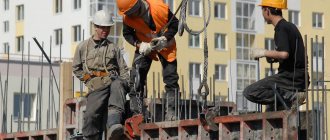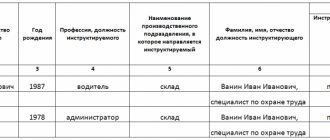The procedure for conducting unscheduled briefings on labor protection
Conducting labor safety briefings is an obligation of the employer, the purpose of which is to ensure the proper level of labor protection (OHS). We continue the series of materials about instruction and offer to understand when it is necessary to conduct unscheduled instruction, what tasks it solves, and how it differs from introductory or repeated instruction.
Unscheduled training is intended for employees who need to familiarize themselves with new information on occupational safety. It is also taken by employees who have interrupted work for 30 or 60 calendar days.
When is unscheduled training needed?
- Changes in technological processes, replacement, modernization of equipment, tools or other factors affecting safety and working conditions.
- A break in an employee’s work - in the case of work with harmful and/or dangerous working conditions - more than 30 calendar days, for other work - more than 60 calendar days.
- New instructions and changes to existing ones on occupational safety in the workplace, safe work performance or other technological documentation. In case of changes in legislative, regulatory and legal acts that contain requirements regulating the procedure for performing work that is entrusted to the employee.
- Violation by an employee of occupational safety requirements, if this caused a real threat - an accident, a production accident, etc.
- At the request of officials of state supervision and control bodies, public control.
- By decision of the head of the training organizer or an authorized official.
Registration of results
Upon completion, an oral test of the acquired knowledge is carried out. Those who do not pass the test are not allowed to work (Article 76 of the Labor Code of the Russian Federation), about which a corresponding order is drawn up.
Those who successfully pass the verification receive a certificate in the form according to Appendix 2 to the Procedure.
The results of the inspection are documented in a protocol (the form is established in Appendix 1 to the Procedure). A note is made in the appropriate journal according to the forms established by GOST 12.0.004-2015 (Gosstandart Order No. 600-st).
Material on the topic: Why do you need a workplace briefing log?
Order to carry out
When and where do unscheduled instructions take place?
The timing of an unscheduled briefing depends on its reason. If this is a change in the technological process, the use of new equipment, etc., then instruction must be carried out before starting work under new conditions. In case of violation of occupational safety requirements at similar enterprises, accidents, etc., the period for conducting labor safety briefings is set by the manager and responsible employee.
The location of the unscheduled briefing is determined based on its content. If it is carried out due to changes in production processes, an accident, replacement of equipment and similar factors, then it takes place at the workplace. If the reason was changes in legislation that relate to general occupational safety issues, and which can be sufficiently covered without reference to the premises, then the instruction can be carried out in a conference room or meeting room.
Timing of briefings
Education in the field of occupational safety must be systematic and regular. For this purpose, the standards establish the frequency of fire safety briefings.
Repeated fire safety briefings should be carried out once a year for ordinary organizations and 2 times a year for enterprises that are classified as facilities with a fire-hazardous technological process/production.
For other types of briefings, frequency should be based on practical considerations and common sense. For example, it is obvious that induction training is carried out before a new employee starts working, and unscheduled training is carried out when the above-mentioned cases occur.
How to conduct an unscheduled briefing?
In order to organize labor safety training you need:
- Have a document that clearly defines the need for unscheduled training. This could be a notice of an accident, accident, fire and their consequences, a new version of a law or regulation, an order from a regulatory body or a higher organization, etc. This document will need to be referenced in the order for unscheduled instruction on labor protection.
- Prepare an order that will indicate the reason for the instruction, the instructor, the location, the persons who are required to undergo it and the timing of the instruction.
- Prepare and approve a training program. It can be common for all instructees or separate for workers of different positions and professions. Before approval, the unscheduled instruction program is agreed upon by the labor protection service and the trade union committee.
- Organize instruction: explain new information to employees, test knowledge, make entries in the journal.
Peculiarities
The peculiarity of unscheduled briefings is the absence of a pre-developed and approved program for conducting labor safety briefings of this type. In order to prepare for it as much as possible, the person responsible for labor protection in the organization should draw up a procedure for developing and approving a program for typical cases. Typical cases include changes in the requirements of regulatory documentation, accidents, identification of employees with gaps or erroneous knowledge of occupational safety.
When unscheduled instruction on labor protection is carried out due to changes or the introduction of new rules, codes, GOSTs and other regulatory documentation of state significance, a state inspector or employees of a specialized training center can be invited to conduct it. One such organization is EcoStandard group. It includes a Training and Methodological Center, which develops training programs taking into account the latest changes in legislation and current cases from the practice of Russian companies.
What measures to take if labor protection requirements change?
If new labor protection rules have come into force or labor protection requirements have changed, carry out a number of organizational and technical measures:
- make changes to local acts;
- conduct unscheduled briefing;
- Conduct occupational safety training and an extraordinary knowledge test.
Making changes to local acts
When changing labor protection rules, review local labor protection regulations: instructions, training programs, briefing programs, etc. Reflect the new requirements in these documents. To do this, you can make changes to existing acts or approve new ones.
If you make changes to the labor safety instructions, take into account the opinion of the elected body of the primary trade union organization or another body authorized by employees (Part 22 of Article 212 of the Labor Code of the Russian Federation).
Conducting unscheduled briefings
Unscheduled training is carried out when new or changed legislative and other regulatory legal acts, as well as labor protection instructions, have come into force. This is indicated in paragraph 2.1.6 of the Procedure for training in labor protection and testing knowledge of labor protection requirements for employees of organizations, approved by Resolution of the Ministry of Labor of Russia, the Ministry of Education of Russia dated January 13, 2003 No. 1/29 (hereinafter referred to as the Training Procedure dated January 13, 2003 No. 1/29).
Unscheduled briefing is carried out by the immediate supervisor of work at a specific workplace only with those employees affected by changes in legislation.
Instruction can be carried out:
- individually with each employee;
- with a group of workers of the same profession or position.
After the briefing, the instructor conducts an oral test of the knowledge and skills acquired by the employee in safe work practices (clause 2.1.3 of the Training Procedure dated January 13, 2003, No. 1/29). Employees who demonstrate unsatisfactory knowledge are not allowed to work independently. They are required to undergo training again. In this case, issue an order to remove these employees from work.
At the end of the unscheduled briefing, enter the following in the briefing log:
- the date of its holding;
- a record of the briefing with the obligatory signatures of the person being instructed and the person instructing;
- information about the reason for the briefing.
Unscheduled instruction can be replaced with targeted special training and testing of knowledge of labor protection requirements.
Training and extraordinary knowledge testing
If labor protection requirements have come into force or have changed, conduct an extraordinary test of workers’ knowledge of labor protection requirements, including:
- commission members;
- managers and specialists;
- blue-collar workers.
Carry out an extraordinary knowledge test only for employees whose work function is directly related to the requirements specified in the changed regulatory legal acts. Test your knowledge of new regulations only. This is stated in paragraph 3.3 of the Training Procedure dated January 13, 2003 No. 1/29.
The procedure for an extraordinary test of knowledge of requirements when introducing new ones or making changes and additions to existing regulatory legal acts, as well as the list of persons who must pass this test, are determined by a local act of the organization.
To conduct an extraordinary knowledge test, create a knowledge testing commission. The commission must consist of at least three people who have undergone training and knowledge testing on labor protection, taking into account the new labor protection requirements. The commission is approved by the employer by order (clause 3.4 of the Training Procedure dated January 13, 2003 No. 1/29).
Training organizations can test the knowledge of occupational safety requirements only of those employees who have undergone occupational safety training on their basis (clause 3.9 of the Training Procedure dated January 13, 2003 No. 1/29).
If an employee has not passed the knowledge test of labor protection requirements, he is obliged to undergo a second knowledge test no later than one month (clause 3.8 of the Training Procedure dated January 13, 2003 No. 1/29).
Employees who have not undergone training and knowledge testing in the prescribed manner are suspended from work by the employer from the moment they pass the knowledge test (Articles 76 and 212 of the Labor Code of the Russian Federation).
Algorithm of actions when changing labor protection requirements
- send at least three members
of the commission and managers and specialists whose work function is directly related to the requirements specified in the changed regulatory legal acts to the training organization; - establish a single topic for unscheduled briefing
and extraordinary knowledge testing - “Labor safety requirements in connection with the entry into force of labor protection rules”; - train employees
according to the schedule approved by the head of the organization; - conduct an extraordinary knowledge test;
- draw up all the necessary local documents
in accordance with the Training Procedure (certificate, knowledge test protocol and a log of registration of briefings on labor protection in the workplace).
About Us
The training center conducts an extraordinary test of knowledge of labor protection requirements, as well as full-time and distance learning courses:
Modern classroom with multimedia equipment
Teaching aids and visual materials
Practical teachers with extensive experience
Training at a convenient time without interruption from work
Diplomas and certificates of the established form
Wide range of educational programs
The following forms of training are available:
- full-time education;
- distance (electronic) learning.
CONTACTS
Phone E-mail
Internal numbers of specialists
Sales Manager Natalya Vladimirovna Kozina
tel. (ext. 629) mob. 8-966-708-30-81
Head of Sales Department Vasenin Pavel Vladimirovich
tel.
(ext. 607) mob. 8-962-316-16-17 E-mail
part 22 art. 212 Labor Code of the Russian Federation
The employer is obliged to provide:
development and approval of rules and instructions on labor protection for employees, taking into account the opinion of the elected body of the primary trade union organization or other body authorized by employees in the manner established by Article 372 of this Code for the adoption of local regulations;
clause 2.1.6 of the Labor Safety Training Procedure 1/29
2.1.6. Unscheduled briefing is carried out:
upon the introduction of new or amended legislative and other regulatory legal acts containing labor protection requirements, as well as labor protection instructions;
when changing technological processes, replacing or upgrading equipment, devices, tools and other factors affecting labor safety;
when employees violate labor safety requirements, if these violations create a real threat of serious consequences (industrial accident, accident, etc.);
at the request of officials of state supervision and control bodies;
during breaks in work (for work with harmful and (or) dangerous conditions - more than 30 calendar days, and for other work - more than two months);
by decision of the employer (or his authorized person).
clause 2.1.3 of the Labor Safety Training Procedure 1/29
2.1.3. In addition to introductory briefing on labor protection, initial briefing in the workplace, repeated, unscheduled and targeted briefings are carried out.
Initial briefing at the workplace, repeated, unscheduled and targeted briefings are carried out by the immediate supervisor (producer) of the work (foreman, foreman, teacher, etc.), who has undergone occupational safety training in the prescribed manner and tested knowledge of labor safety requirements.
Conducting labor safety briefings includes familiarizing workers with existing hazardous or harmful production factors, studying labor safety requirements contained in the organization’s local regulations, labor safety instructions, technical and operational documentation, as well as the use of safe methods and techniques for performing work.
The labor safety briefing ends with an oral assessment of the employee’s acquired knowledge and skills in safe work practices by the person conducting the briefing.
Conducting all types of briefings is registered in the relevant logs of briefings (in established cases - in the work permit) indicating the signature of the person being instructed and the signature of the instructing person, as well as the date of the briefing.
clause 3.3 of the Labor Safety Training Procedure 1/29
3.3. An extraordinary test of knowledge of labor protection requirements for employees of organizations, regardless of the date of the previous test, is carried out:
when introducing new or making changes and additions to existing legislative and other regulatory legal acts containing labor protection requirements. At the same time, knowledge of only these legislative and regulatory legal acts is tested;
when commissioning new equipment and changes in technological processes that require additional knowledge on labor protection for workers. In this case, knowledge of labor protection requirements associated with the relevant changes is checked;
when assigning or transferring employees to another job, if new duties require additional knowledge on labor protection (before they begin to perform their job duties);
at the request of officials of the Federal Labor Inspectorate, other bodies of state supervision and control, as well as federal executive authorities and executive authorities of constituent entities of the Russian Federation in the field of labor protection, local government bodies, as well as the employer (or a person authorized by him) when establishing violations of the requirements labor protection and insufficient knowledge of occupational safety and health requirements;
after accidents and incidents that have occurred, as well as when repeated violations by employees of the organization of the requirements of regulatory legal acts on labor protection are identified;
if there is a break in work in this position for more than one year.
The scope and procedure for an extraordinary test of knowledge of labor protection requirements are determined by the party initiating it.
clause 3.4 of the Labor Safety Training Procedure 1/29
3.4. To test the knowledge of labor protection requirements of employees in organizations, by order (instruction) of the employer (manager), a commission is created to test the knowledge of labor protection requirements, consisting of at least three people who have undergone training in labor protection and testing of knowledge of labor protection requirements in the prescribed manner.
The commissions for testing knowledge of labor protection requirements of organizations include heads of organizations and their structural divisions, specialists from labor protection services, chief specialists (technologist, mechanic, power engineer, etc.). Representatives of the elected trade union body representing the interests of the employees of this organization, including authorized (trusted) persons for labor protection of trade unions, can take part in the work of the commission.
The composition of the commissions for testing knowledge of labor protection requirements of training organizations includes heads and full-time teachers of these organizations and, by agreement, heads and specialists of federal executive authorities, executive authorities of constituent entities of the Russian Federation in the field of labor protection, state supervisory authorities and control over compliance with labor legislation, local government bodies, trade union bodies or other representative bodies authorized by employees.
The commission for testing knowledge of labor protection requirements consists of a chairman, deputy chairman(s), secretary and members of the commission.
clause 3.9 of the Labor Safety Training Procedure 1/29
3.9. Training organizations can test the knowledge of occupational safety requirements only of those employees who have undergone occupational safety training.
clause 3.9 of the Labor Safety Training Procedure 1/29
3.8. An employee who has not passed the knowledge test of labor protection requirements during training is required to undergo a second knowledge test no later than one month.

